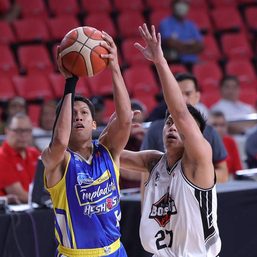SUMMARY
This is AI generated summarization, which may have errors. For context, always refer to the full article.

MANILA, Philippines – The Philippine government vowed to end smuggling after an international advocacy group on Tuesday, February 4, said $410 billion in illicit transactions flowed in and out of the Philippines over the past 52 years.
Bureau of Internal Revenue (BIR) Commissioner Kim Henares said the war on smuggling, in the end, will help the poorest Filipinos.
“If we are not able to address smuggling, we cannot have industry. If we don’t have industry, we cannot create jobs. If we cannot create jobs, poverty will remain the same,” Henares told Rappler after Global Financial Integrity (GFI), a non-profit research and advocacy group, reported its findings on illicit money. (READ: PH loses $410B in illicit transactions)
Vincent Lazatin, executive director of the Transparency and Accountability Network, said illicit money “affects the poor very directly.”
“When you have a misdeclaration of imports and exports, what that means is that you’re not paying taxes or proper customs duties. And these are funds that should be going into government funds, which then should fund school programs, health programs, all other social services,” Lazatin said.
In its report, the GFI said $133 billion in outflows and $277 billion in inflows went unreported in the Philippines from 1960 to 2011. This deprived the Philippines of revenues that could’ve been used to help the poor.
Nearly one out of 5 Filipinos is poor, government statistics show. (READ: PH poverty almost unchanged since 2006)
GFI managing director Tom Cardamone told Rappler, “This is a crisis situation for this country.”
Reforms under way
During the launching of the report in Makati City, Henares read a list of reforms that Bureau of Customs (BOC) Commissioner John “Sunny” Sevilla wanted her to convey.
Sevilla excused himself from the forum because the BOC is “preoccupied” with congressional hearings, incidentally, on rice smuggling. (READ: NBI arrests Bangayan after Senate hearing)
Henares said the BOC, for one, will upgrade its “value reference guide” for the first time. This guide will show “how much a product should cost.”
She said the BOC is also posting importation data on its website. She said the bureau on Tuesday will post the data for January.
She described these as some of the government’s “transparency tools.”
Evaluating the government’s moves against smuggling, Lazatin said the government “started in the right direction in terms of the reforms in the Bureau of Customs.”
Sevilla’s appointment in itself is a major reform.
Wanted: Political will
In an interview with Rappler, Sevilla said improving the BOC’s efficiency is key to changing its negative image. (Watch more in the video below.)
“But of course,” Lazatin added, “aside from getting the right people in the right place, it’s also about…putting the proper procedures in place, so that almost regardless of who’s there, things should work.”
Cardamone, for his part, said the solution begins with “political will by the highest levels of government.” (Watch more in the video below.)
For him, President Benigno Aquino III seems to have started this. He noted that during his State of the Nation Address in 2013, Aquino shamed the BOC for its failure to curb smuggling.
Cardamone said: “What’s needed is for the President to have the head of the department’s back, so to speak. He has to support that new position. It can’t be a fleeting interest in trying to address this problem. It has to be a long-term sustained effort by the highest levels of the government, that this is going to change.”
After criticizing the BOC for corruption and inefficiency in his SONA, however, the President refused to accept the resignation of then BOC chief Rufino Biazon, his party mate and appointee.
Biazon was only allowed to go when he submitted a second resignation months later, this time after he was named a respondent in a corruption case over the misuse of his pork barrel when he was congressman of Muntinlupa City. – Rappler.com
Add a comment
How does this make you feel?





There are no comments yet. Add your comment to start the conversation.